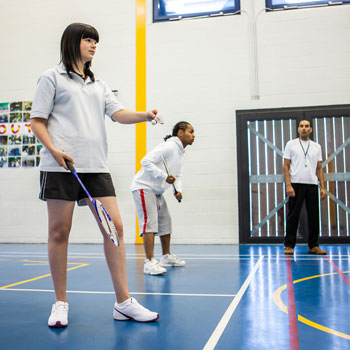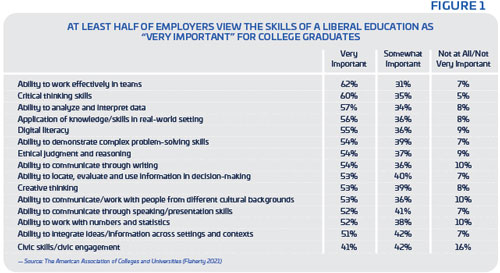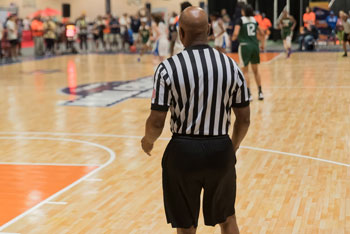College students often have a need or desire for income. Students have to balance busy class schedules with a job, often on campus. Many student positions are bullet points on a resume, but some don’t provide sought-after skills for later employment. There is a job on every campus, however, where students can posit ively impact their career development during every work shift. This college job provides students with the opportunity to be trained to communicate in high-stress situations, to negotiate, to learn from failure and to gain experience by doing.
ively impact their career development during every work shift. This college job provides students with the opportunity to be trained to communicate in high-stress situations, to negotiate, to learn from failure and to gain experience by doing.
The selling point of this position isn’t the pay or the time it occupies in a student’s schedule, but rather the skills and deliverables that can be gained. Students aspire to find a position on campus where they are consistently learning and taking initiative to find growth opportunities. There is one position that falls beneath most students’ radar that will provide these benefits and pay as well. The position that we are writing about is a sports official. Students who work as sports officials gain transferable skills that are rarely ever considered when looking for part-time employment. We have examined the research, interviewed officials and completed a comprehensive literature review that demonstrates the future value of officiating as a college student.
Intramural Officiating
Officials are critical to maintaining fair competitions. Officials must possess a wide range of skills and traits that are transferable into various workplaces and highly sought by employers. In a 2021 survey, The American Association of Colleges and Universities found that employers look for a wide range of skills, including, but not limited to, critical thinking, problem-solving, teamwork traits, strong work ethic, strong communication and leadership. (See Figure 1.)

Human resource directors and companies are seeking employees who already have skills, but many of these traits cannot be acquired in a classroom. The challenge that interviewees face is being able to describe and detail how they have acquired skills, since they can be difficult to quantify. Students who have officiated sports matches will have no issue identifying their skills because they work several games per shift and encounter multiple unique situations in every game they officiate. For example, players might argue about a call that was made or a call that they thought was missed, putting officials in situations where their skills are put into action.
Skills and Deliverables
1. Critical Thinking and Problem-Solving: Officials are responsible for making split-second decisions, resolving conflicts and enforcing calls with the student participants who expect no less than a perfect execution of the game. This requires analyzing difficult situations in real time under the pressure of participant scrutiny, while also balancing the participants’ experience with making difficult calls. This requires grace under pressure.
and enforcing calls with the student participants who expect no less than a perfect execution of the game. This requires analyzing difficult situations in real time under the pressure of participant scrutiny, while also balancing the participants’ experience with making difficult calls. This requires grace under pressure.
2. Teamwork and Collaboration: Cooperation with fellow officials is important in maintaining the integrity of the entire staff. An officiating crew will quickly lose the participants’ respect if they aren’t supporting one another’s calls and talking negatively of fellow staff members. Officials have to come together to make difficult calls and be prepared to have one another’s backs during difficult games or when participants get emotional.
3. Professionalism and Strong Work Ethic: Officials have to remain calm and professional to retain the respect of their co-workers and of participants. Professionalism includes demonstrating fairness, respecting the game and the players, and upholding all rules and regulations of the sport. In order to do this, officials must put in a significant amount of time to learn the rules of each sport and be prepared to learn through trial and error.
4. High-Stress Communication: Each shift, an intramural official will have to quickly make close calls and decisions that could potentially affect the outcome of the game. These decisions will often be highly contested by participants. Officials are required to be able to respond to their complaints. The response must be calm and controlled or else the situation might escalate and cause the game to spiral out of control. Officials learn through experience the ability to transform and diffuse a contested call that enrages a team so that both teams can continue to enjoy their intramural game. An official must learn how to respectfully communicate with participants from various backgrounds, having empathy to understand when participants have less knowledge or skill of the sport.
5. Leadership: The key to learning to be an effective official is watching and working with other officials who have more experience. Officials also must take direction, guide participants and assist new officials in learning  how to officiate. This experience helps develop confidence and the ability to uplift co-workers and participants. Officials must also be able to direct all participants in the game in an understanding of the rules, helping to explain what they did wrong while ensuring a safe game experience.
how to officiate. This experience helps develop confidence and the ability to uplift co-workers and participants. Officials must also be able to direct all participants in the game in an understanding of the rules, helping to explain what they did wrong while ensuring a safe game experience.
Working with participants is similar to working with clients in any industry. The official provides a service (officiating a sport) to the client (sports participant), and the official must provide a high level of customer service to ensure that the client is satisfied. These skills are transferable into management positions, counseling, teaching, customer service, event coordinating, auditing, consulting, HR, regulatory agent, project coordinating, healthcare and many other professions. As in these other fields, understanding these skills is the key for intramural programs to successfully recruit, train and maintain a strong staff.
The qualifications required for an official include:
- Strong interpersonal communication skills.
- Projecting a positive image for the school and department of campus recreation.
- Maintaining high standards and a desire to improve and enhance officiating skills.
- Ability to work independently and in a team atmosphere.
- Demonstration of understanding of the official’s role in ensuring the safety of participants and self.
- Holding peers and oneself accountable.
- The ability to learn and effectively respond to emergency situations.
These qualifications clearly reinforce the deliverables and skills that an employee in any career position should demonstrate. Many of these responsibilities and duties will not come easily to officials at first. In order to get the most out of the job, officials must strive beyond their comfort zone and seek improvement. The head of officials should give all of their employees an equal chance to elevate their performance and get the most out of the job.
How to Recruit
Campus recreation should highlight how these skills give their officials a unique advantage in interviewing for future positions. It is valuable for candidates to highlight these transferable skills and experiences on their resumes and during job interviews. Every student should graduate with a story about challenging experiences that they overcame. Intramural officials gain many valuable experiences, and campus recreation can focus on assisting students to be prepared for job interviews.
Positioning the experience correctly by quantifying accomplishments with specific measures will give officials an upper hand in the job market and open the door to many career opportunities not limited to sport. The goal is to have students look at the job application, not just focusing on the job at hand but rather on all of the career development opportunities that it offers.
College recreation programs could address this in the application process to give students the full understanding that intramurals are not just a job. These positions carry value beyond the current role. This positioning can open the eyes of many job-seeking students to consider officiating and become more marketable for a full-time role in nearly any future professional field.
Summary
Many universities are dealing with a lack of applicants for referee positions. By promoting officiating in campus recreation with specific recommendations on how to grow a pool of candidates to gain the deliverable skills needed in the workplace, the university can outweigh the negatives of the job with career development opportunities. Officials will be able to enhance the culture of campus recreation programs and make it a desired job. This allows officials to have a distinguished path of growth and learning opportunities to be set up for future jobs. Being a sports official may involve criticism and struggles; however, the rewards and values associated with the role make it a fulfilling experience because this job has marquee value for anyone’s future. RM
ABOUT THE AUTHORS
Andy Mason has worked in campus recreation as an intramural official, supervisor and sports club administrator. He is pursuing a degree in Sports Management and Business Administration and wants to work in marketing and sales. Tyler Lebegue is an undergraduate at the University of Dayton studying sports management. Tyler has worked as a campus recreation competitive sports intramural referee for three years and supervisor for one year. He has an interest in pursuing a career in sports marketing on the agency side. Peter Titlebaum, Ed.D., is a professor at the University of Dayton. Area of expertise include marketing, sales, fund-raising, activation, return on investment and return on objective strategies.



